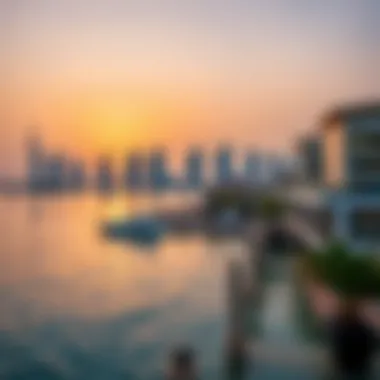La Vie Dubai: Exploring the Real Estate Market


Intro
Dubai is like a rollercoaster ride for those diving into its real estate market. The city, known for its skyscrapers and lavish lifestyle, has become a hotspot for investors and homeowners alike. The rapid growth of the Dubai property sector is influenced by many factors, from economic trends to lifestyle choices. Understanding these dynamics can make or break a deal in this bustling metropolis.
In this exploration, we will navigate through the twists and turns of Dubai's real estate landscape. By examining current trends, investment opportunities, and historical performance, we aim to present a comprehensive guide for anyone looking to stake their claim in this vibrant city.
Market Analysis
Current Trends in Dubai Real Estate
The Dubai real estate market is always on the move. As we step into 2023, several trends have started to emerge that are reshaping the way people buy and invest in property here.
- High Demand for Luxury Properties: In recent years, there’s been a noticeable shift towards luxury living. Buyers are increasingly looking for high-end villas and penthouses that not only offer stunning views but also provide a lifestyle of comfort and exclusivity.
- Sustainable Developments: The focus on sustainability is not just a trend; it’s becoming a norm. Developers are integrating green practices and eco-friendly materials into their buildings, attracting buyers who want to make more conscious choices.
- Smart Homes: The rise of technology has paved the way for smart home features in Dubai properties. Automated systems for security, heating, and lighting are now desirable features in many residential buildings.
Historical Market Performance
To fully appreciate the current state of Dubai's real estate environment, we must take a look back at its historical performance. The past decade has been a rollercoaster ride of peaks and valleys, characterized by periods of intense growth followed by softer markets.
From the glasses-half-full perspective, the market rebounded strongly after the 2008 financial crisis, reaching new heights between 2013 and 2014. However, it faced challenges in 2018, with price corrections observed across various segments.
What stands out is how the market has transformed since:
"Dubai's real estate market has become increasingly resilient. The past fluctuations have led to more cautious, informed buyers who make decisions based on thorough research rather than impulse."
This adaptability is key for anyone considering entry into the market.
Investment Opportunities
Best Areas for Real Estate Investment
When discussing where to invest, location is critical. Certain areas in Dubai have shown resilience and promise for long-term appreciation. Here are a few hotspots:
- Dubai Marina: Popular among expatriates and affluent buyers, the Marina offers a stunning waterfront lifestyle. Properties here typically see high rental yields.
- Downtown Dubai: Home to the iconic Burj Khalifa and Dubai Mall, this area attracts those seeking luxury and prestige. The demand remains robust, even with fluctuations.
- Jumeirah Village Circle (JVC): This area offers a balance of affordability and proximity to essential amenities. It has become increasingly popular among first-time buyers and renters.
Understanding Property Value Appreciation
Investors must grasp the nuances of property value appreciation. Factors influencing this include:
- Infrastructure Developments: New transport links and amenities can significantly enhance the value of an area. The upcoming expansion of the metro system is a game-changer for accessibility.
- Economic Factors: The overall economic conditions impact buyer sentiment. An upturn in the job market generally leads to increased demand for housing.
- Regulatory Environment: Changes in laws and regulations, such as easing property ownership for expatriates, can spur further investment in the market.
As we continue exploring the intricacies of this alluring market, be prepared to uncover the essential insights needed for making informed decisions. By navigating through opportunities carefully, potential buyers and investors can truly tap into the potential that Dubai's real estate landscape offers.
Preface to Dubai's Real Estate
Dubai's real estate market stands as a beacon of growth amidst a landscape marked by rapid development and economic dynamism. The city, known for its skyline dominated by iconic structures like the Burj Khalifa, offers a unique blend of tradition and modernity that attracts a global audience. This section aims to establish the relevance of understanding Dubai's real estate landscape by emphasizing its importance for various stakeholders, including investors, buyers, and realtors alike.
The shifting sands of Dubai's development reveal a canvas rich with opportunity, underpinned by a robust economy, favorable regulatory frameworks, and a diverse melting pot of cultures. To navigate this complex yet rewarding market, a holistic comprehension of both historical context and current market dynamics is essential. Whether you're exploring investment opportunities or finding a place to call home, the intricacies of Dubai's real estate scene wield significant influence over decisions.
Historical Context of Real Estate Development
Dubai's transformation from a modest fishing village into a metropolis is nothing short of remarkable. The turning point came in the late 20th century, fueled by the discovery of oil. This wealth allowed for ambitious projects, and as a result, the real estate market began to burgeon in the early 2000s. The introduction of freehold property laws in 2002 marked a significant milestone, enabling foreigners to own property and spurring an influx of international investment.
Developments like the Palm Jumeirah and Burj Al Arab showcased Dubai's architectural ambitions, signaling its desire to compete on a global scale. This era was not just about quantity but quality; cutting-edge designs and luxurious amenities became synonymous with Dubai living. Understanding this backdrop can help potential investors grasp the ethos that propels current developments and residential trends.
Current Market Overview
As of 2023, Dubai's real estate market is characterized by a confluence of factors that impact its appeal and resilience. The sector demonstrates a robust recovery after period of fluctuations, driven by various incentives set forth by the government. For instance, the implementation of long-term residency visas for investors and professionals has set the stage for a more stable property market.
Current statistics suggest a thriving environment where both sales and rent prices are witnessing an uptick in many neighborhoods. In particular, areas such as Dubai Marina and Downtown Dubai are bustling with activity, appealing to both high-net-worth individuals and newcomers drawn by the city's lifestyle offerings. Factors such as increased tourism, diversified economic activity, and ongoing infrastructure projects, like the expansion of the Dubai Metro, continue to bolster real estate demand.
"The recovery in Dubai's real estate lays the groundwork for solid investment opportunities, making now a prime time for exploration of both residential and commercial properties."
Both expatriates and locals are increasingly engaged in the market, leading to a rich tapestry of buyer sentiment that reflects a blend of aspirations and financial goals. Investors focusing on Dubai's real estate must keep these currents in mind, as they shape a landscape ripe for growth, innovation, and lifestyle enrichment.
Key Factors Driving the Market
The Dubai real estate market is akin to a well-oiled machine, with numerous intricate parts working together to fuel its growth and evolution. Understanding the key factors driving this market is essential for anyone looking to invest or engage with it. The elements at play are multifaceted and interdependent, encompassing economic influences, regulatory environment, and demographic trends. Each of these factors not only shapes the landscape but also provides insight into the overall performance and resilience of the market.
Economic Influences
Dubai's economy, often dubbed as an economic powerhouse in the Middle East, plays a pivotal role in determining the direction of its real estate market. The country has made substantial investments to diversify beyond oil dependency, leading to vibrant sectors like tourism, hospitality, and finance. For instance, the rise of the Expo 2020, now an essential event in Dubai's economic calendar, has led to a marked increase in demand for both commercial and residential properties.
Additionally, the resurgence in global economics post-pandemic has reignited interest in investments in Dubai. Properties are snapped up like hotcakes in neighborhoods that show signs of growth. The influx of international businesses setting up shop in Dubai has created a demand for high-quality office spaces.


Moreover, favorable currency exchange rates make Dubai a lucrative investment for foreign buyers, significantly driving market activity. Investors take note when the numbers align, and Dubai remains a fair bargain for many, despite its luxurious reputation.
Regulatory Environment
Navigating the regulatory landscape can be as complex as navigating the many roads of Dubai itself. However, understanding the regulations governing property ownership and investments is crucial for investors and buyers alike. The government has taken strides to create an investor-friendly environment that encourages property purchases both locally and internationally. Changes such as long-term visas for property owners signify a commitment to attracting foreign investments.
Further, initiatives like Dubai Land Department's Smart Dubai strategy has made the registration and transfer of properties more streamlined. This ease of process can significantly affect how quickly deals are closed, often making or breaking a potential investment. Still, potential buyers must be aware of specific regulations that differ from other global markets. For instance, freehold versus leasehold ownership can dictate whether an investor can fully own a property or only lease it for a set number of years.
Demographic Trends
The demographic composition of Dubai is as colorful as a bustling market street. An ever-growing expatriate community mixes with the local population, creating a unique demand for diverse property types. Recent data indicate rapid population growth, driven by professionals from various industries flocking to Dubai in search of opportunities. The cultural melting pot makes it ripe for residential developments tailored to different lifestyle preferences, from modern high-rises to more traditional community settings.
Additionally, millennials are becoming a significant force in the real estate market. This generation often seeks out housing that reflects their values such as sustainability, accessibility, and modern amenities. Developers are keen to cater to these trends, leading to innovative projects that promise to attract today’s younger buyers.
Ultimately, staying attuned to these demographic shifts can help investors identify promising neighborhoods before they become hotspots. A well-timed investment can lead to substantial returns as the landscape continues to evolve.
In summary, the health of Dubai's real estate market hinges on understanding these underlying factors—from economic conditions and regulatory frameworks to shifting demographics. Investors, realtors, and developers who grasp these elements stand to gain a competitive edge in this vibrant market.
Learn more about Dubai's economy here. For insights on regulatory frameworks, visit this site. Explore demographic data through statistics.
Attractive Investment Opportunities
Investment in Dubai's real estate is not just a financial decision; it's a way to tap into a dynamic market brimming with potential. The city has carved a niche on the global stage, attracting diverse investors ranging from expatriates to international wealth funds. Understanding the landscape of investment opportunities can present a considered approach for discerning individuals and organizations seeking to make their mark.
When considering attractive investment avenues, one should keep a few key aspects in mind:
- Market Viability: With a steady influx of tourists, expatriates, and businesses, Dubai's property market is characterized by its resilience and adaptability. Owning property here isn’t merely about having a physical asset; it’s about owning a piece of a thriving economic engine.
- Government Initiatives: The government actively promotes foreign investment by easing regulations and providing incentives. Initiatives like the Golden Visa program encourage long-term residency and have resulted in a vibrant property market.
- Potential Returns: The rate of rental returns in certain sectors can be quite appealing, especially compared to more saturated markets worldwide. Investors often find that properties in strategic locations yield strong returns while maintaining capital value growth.
To truly navigate these opportunities, it is essential to delve into specific sectors that showcase unique characteristics and benefits. Here we go into the details of three key areas.
Emerging Neighborhoods
Emerging neighborhoods in Dubai are hotspots for investment, often offering lower entry costs with significant upside potential. Areas such as Dubai South and Jumeirah Village Circle are becoming increasingly popular due to their infrastructure developments and proximity to key facilities like the Expo 2020 site.
Investors should focus on:
- Growth Potential: As these areas develop, property values tend to appreciate. This is particularly true for areas that are part of the larger urban planning and development projects envisaged by the government.
- Community Spirit: Emerging neighborhoods often boast a sense of community that can resonate well with families and young professionals. The availability of schools, parks, and shops can help maintain high demand, thus guaranteeing rental income.
Luxury Developments
Dubai is synonymous with luxury. The luxury real estate segment continues to thrive, driven by high-net-worth individuals seeking unparalleled lifestyle experiences. Developments like the Burj Khalifa Residences and Palm Jumeirah have set the bar for opulence in living.
Key points worth noting include:
- Prestige Factor: High-end properties often attract wealthy expatriates and investors who see these purchases as status symbols. This can lead to substantial profit margins when the properties are resold or rented out.
- Amenities and Lifestyle: Luxury developments are designed with lavish amenities including spas, pools, and concierge services that enhance the living experience, making these properties particularly attractive for rental.
Commercial Properties
The commercial real estate sector in Dubai is another lucrative area, characterized by robust demand from multinational corporations and local businesses. Offices in areas like Dubai Media City or Dubai Silicon Oasis are highly sought after.
Maurice, the following factors underscore their appeal:
- Business Growth: With Dubai being a hub for entrepreneurship, the demand for commercial space is on the rise. Investing in properties that cater to this sector can yield substantial returns.
- Strategic Locations: Proximity to business districts and free zones often makes commercial properties more desirable. Investors should look for locations that promise foot traffic and visibility.
"Investing in Dubai's real estate means being part of a vision that continually evolves and adapts to global trends."
Lifestyles in Dubai
The lifestyles in Dubai are a standout aspect of its real estate narrative, infusing the property market with unique cultural resonances and modern comforts. From luxurious living spaces to the rich tapestry of cultural interactions, understanding these lifestyles provides crucial insights for investors and residents alike. They shape not just where people live, but how they live.
Cultural Dynamics
Dubai's cultural dynamics are a beautiful blend of traditional Arab sensibilities and contemporary global influences. This mixture creates a dynamic social fabric where art, food, and festivals play crucial roles in daily life. For instance, the annual Dubai Shopping Festival is not just about shopping; it’s also a celebration of culture with music, art exhibitions, and food from different parts of the world.
Living in a city that champions its heritage, while also embracing the future, appeals greatly to expatriates seeking a cosmopolitan lifestyle. There are numerous cultural venues such as the Dubai Opera and the Al Fahidi Historical Neighborhood that narrate the emirate's transition from a coastal town to a bustling metropolis.
Investors who grasp these cultural nuances are better positioned to cater to the diverse population's housing needs. A more culturally aware property can yield higher returns as these resonate with residents looking for a sense of belonging.
Urban Amenities
When it comes to urban amenities, Dubai truly sets the bar high. Residents often gravitate towards properties that provide easy access to entertainment, shopping, and recreation. The famous Dubai Mall is not just a shopping destination; it hosts an aquarium, an ice rink, and a plethora of dining options.
More than mere conveniences, these amenities serve to build community. Parks, art galleries, and shared spaces like the Dubai Design District foster interactions among residents, enhancing their lives beyond the four walls of their homes. This interconnectedness makes the neighborhoods more appealing to prospective buyers or renters.
Here’s a quick overview of some key urban amenities:


- Public parks and green spaces
- Luxury shopping centers
- Health and wellness facilities
- Cultural institutions like museums and galleries
Sustainability Initiatives
The 21st century calls for a more environmentally conscious approach, and Dubai is not falling behind. Recent years have seen a surge in sustainability initiatives, aligning with global movements toward greener living. Projects like the Mohammed bin Rashid Al Maktoum Solar Park spearhead Dubai’s shift towards renewable energy, aiming to fulfill a significant fraction of the city’s energy needs.
Moreover, many residential developments are now incorporating eco-friendly designs, using sustainable materials, and ensuring energy efficiency. These initiatives not only attract environmentally conscious buyers but also enhance the long-term viability of investments.
What does this mean for potential investors? Properties that embrace sustainability are likely to remain in demand as residents increasingly prioritize green living spaces. It’s about selling not just a home, but a lifestyle that is aware of and responsive to the larger environmental context.
"In Dubai, the future is as much about living well as it is about living responsibly."
Understanding the lifestyles in Dubai orients investors and homeowners alike. It allows them to cultivate spaces that speak to the heart of this vibrant city, creating homes that cater to today’s diverse and dynamic population.
Property Ownership and Investment Strategies
Understanding property ownership and investment strategies in Dubai is essential for anyone looking to make their mark in this bustling real estate market. Given the unique regulations, diverse ownership types, and appealing investment options available, it’s crucial for investors, realtors, and buyers alike to grasp the nuances of this landscape.
Types of Property Ownership
In Dubai, property ownership is primarily categorized into freehold and leasehold ownership. A freehold property allows the owner to have complete ownership of the property and the land it sits on, giving the buyer absolute rights similar to what one might find in Western countries. This type is particularly attractive for foreign investors, offering them full property rights in carefully designated areas.
On the other hand, leasehold property offers a different set of dynamics. Generally, this allows an investor to lease property for a period of up to 99 years, which may suit those who do not want the hassle of owning property outright. This can be particularly beneficial for businesses and those seeking high-yield rental opportunities without the long-term commitment of ownership.
Buying and owning property, regardless of the type, has its own set of benefits and considerations. Favorable regulations, coupled with Dubai's booming economy, propel the city onto the global investment stage. However, one must always weigh the potential risks against the refreshing opportunities that arise in this vibrant market.
Investment Strategies for Foreign Buyers
Diving into Dubai's property market as a foreign buyer requires strategic planning and a sharp eye for deals. One of the most effective strategies is to focus on emerging neighborhoods where prices are poised for growth. Areas like Dubai South and Dubai Marina have been witnessing significant developments, and investing in these locales could translate to considerable returns in the long run.
Additionally, understanding the tax landscape plays a pivotal role in shaping viable strategies. Unlike many countries, the absence of property taxes in Dubai can greatly enhance the overall profitability of an investment. This aspect offers a leg up for investors looking to maximize their bottom line without bleeding funds into tax liabilities.
Moreover, it is wise to align with local market experts who possess a finger on the pulse of the latest trends and deal patterns. Utilizing real estate agents who specialize in foreign investments can prove invaluable, ensuring one navigates the unique challenges smoothly and effectively.
Financing Options
When it comes to purchasing property in Dubai, an array of financing options are available to ease the burden of upfront costs. Many local banks offer mortgage plans specifically designed for expatriates, which often come with attractive interest rates and flexible terms. This is particularly significant for foreign buyers who may need a helping hand to jumpstart their investment journey.
Furthermore, understanding the mortgage eligibility requirements is crucial. Typically, foreign nationals can borrow up to 80% of a property’s value, making it feasible for many to enter the market without needing to cough up the total amount upfront.
- Key financing options include:
- Fixed-rate mortgages: Allowing the borrower to have consistent payments over the loan term.
- Flexible repayment schemes: Offering options to adjust monthly payments depending on one’s financial situation.
- Islamic finance: Offering Sharia-compliant financing methods, appealing to a wide array of investors.
Exploring these options thoroughly can provide buyers with the financial tools to seize opportunities and establish solid footholds in Dubai's competitive real estate arena.
"Investing in Dubai's property market can be a double-edged sword. Having solid knowledge of ownership styles, investment strategies, and financing options is essential for success."
In summary, delving into property ownership and identifying effective investment strategies in Dubai’s thriving market provides individuals with the necessary framework to navigate what could otherwise feel overwhelming. By familiarizing oneself with the distinct types of ownership and employing well-thought-out strategies, investors can capitalize on the numerous opportunities this stylish city offers.
Navigating the Buying Process
The journey into Dubai's real estate market can feel like stepping into a hustling bazaar, where every turn offers exciting opportunities but can also present its fair share of challenges. In this multi-layered environment, navigating the buying process emerges as a critical theme for anyone looking to make a real estate investment. Understanding the specifics of this journey not only helps in minimizing risks but reshapes the entire experience into something manageable and even rewarding.
Some key elements to consider when diving into the buying process include:
- Market Awareness: Knowing the market trends can save you from overspending or missing lucrative deals.
- Research and Preparation: It's essential to arm yourself with knowledge, whether it’s about property types or financing options.
- Clarity on Goals: Clarifying what you want to achieve with your purchase narrows your focus, whether it be investment, personal use, or rental opportunities.
The benefits of adopting a structured approach are significant. Not only does it streamline the buying process but it guarantees that decisions are backed by solid understanding rather than mere impulse, ultimately leading to a more successful investment outcome.
Steps to Purchase Property
Initiating the buying process begins with clearly defined steps. These steps will guide you through the complex landscape of real estate in Dubai:
- Define Your Budget: Knowing how much you're willing to spend is fundamental. This includes understanding additional costs like transfer fees, registration fees, and maintenance costs.
- Research Locations: Different neighborhoods in Dubai come with their own vibes, infrastructure, and potential future value—so studying these areas is vital. Popular spots like Downtown Dubai highlight a mix of high-end living and cultural exposure.
- Explore Property Listings: With platforms like Property Finder or Dubizzle, browsing through listings offers firsthand insights into what’s available and at what price.
- Seek Financing: If needed, exploring your financing options early can position you better to make informed offers while navigating mortgage processes.
- Secure Ownership Documentation: Once you’ve identified a property, ensuring that all necessary paperwork is accurate and in order helps in avoiding future legal issues.
Working with Real Estate Agents
Real estate agents in Dubai serve as the linchpins of the buying process, especially for foreign investors. Their expertise can make the leap from being an outsider to a property owner much smoother. When choosing an agent, consider their experience, local knowledge, and reputation. An effective agent should come equipped with:
- Market Insight: An excellent agent will not only understand current prices but also predict future market trends.
- Negotiation Skills: They act as intermediaries, ensuring that your interests are represented and leveraged, ideally leading to better deals.
- Network Connections: Agents often have connections that can be invaluable, from property developers to potential buyers and sellers, streamlining the buying experience.
Before signing any agreements, it's wise to clarify their fees and make sure you're comfortable with their proposed strategies. Better to have the devil you know than the one who’s all about the quick sale.


Legal Considerations
Navigating the legal landscape can seem daunting, particularly for those unfamiliar with the UAE property laws. However, understanding the legalities is pivotal in safeguarding your investment. Key legal considerations include:
- Property Ownership Laws: In Dubai, specific rules govern foreign ownership, notably in designated areas such as freehold properties. Knowing where you can and cannot buy is essential.
- Contracts and Agreements: Understanding the terms laid out in the sales agreement is crucial. Employing a legal expert can save you from unforeseen pitfalls.
- Registration Process: Proper registration with the Dubai Land Department is a must. This process directly ties your ownership to the property, giving you legal standing.
"In Dubai's dynamic real estate market, knowledge of legal implications is as essential as having the right property. Ignorance is not bliss here."
Walking through these considerations with careful attention helps you not only in purchasing property but ensures that your investment stands strong over time. Armed with information, a reliable agent, and an understanding of legalities, buyers can fine-tune their focus and secure a property that aligns with their steps in the vibrant Dubai landscape.
Market Trends Analysis
Understanding market trends is essential for anyone looking to navigate Dubai’s real estate landscape. This analysis not only helps in making informed decisions but also in forecasting future developments. Investors need to keep a pulse on the changing patterns to adapt strategies effectively.
In the ever-evolving market of Dubai, examining trends provides critical insights regarding investment potential. Trends can signal where property values might rise or fall, which in turn aids in driving investment choices. This analysis includes evaluating various elements, including economic shifts, regulatory changes, and demographic patterns.
Price Trends
Price trends in Dubai's real estate are a telling indication of the market's health and future direction. Over the past few years, we’ve seen fluctuations influenced by several factors. Prices in established areas such as Downtown Dubai and Dubai Marina have typically been on an upward trajectory, responding to increased demand from both local and international buyers.
However, it’s not all roses; certain neighborhoods have experienced a drop in prices due to an oversupply of properties. For example, areas that saw significant development during the boom years may now contend with a surplus, creating fierce competition among sellers. Understanding these nuances allows buyers to strike while the iron is hot or to hold back when the market is not favorable.
"A wise investor knows that the price of a property today does not necessarily indicate its future value."
Supply versus Demand Dynamics
Analyzing the supply versus demand dynamics is pivotal for comprehending the market balance. In Dubai, the property market sometimes behaves like a yo-yo, swinging between periods of oversupply and acute demand. This sometimes erratic behavior can make waves in property prices.
Currently, demand has increased — driven by factors like the city’s global appeal, hosting major events like Expo 2020, and ongoing immigration. Yet, developers are only just beginning to fill the gap in housing needs, especially for affordable and mid-range properties. If developers continue to keep pace with buyers' expectations, we might see a more stabilized market over the next few years.
- Current Supply Conditions: New properties are regularly coming onto the market, but successful absorption largely depends on location and pricing strategies.
- Future Projections: There is potential for significant growth, particularly as global economic conditions stabilize post-pandemic.
By delving into these intricacies of the market trends, investors and stakeholders gain a framework that enhances their ability to make sound investments in Dubai’s real estate sector. Keeping an eye on these trends could mean the difference between profit and loss, making it a critical area of focus.
Future Outlook for Dubai's Real Estate Market
Dubai's real estate market is more than just a tapestry of shiny skyscrapers and luxurious villas. It's a living organism that adapts to the socio-economic shifts occurring in the region and worldwide. As we plunge into the future outlook of this vibrant market, it becomes clear that staying informed on expected market developments and the long-term investment viability will prove invaluable not only to investors and realtors, but also to buyers and renters seeking stability in an ever-changing environment.
Expected Market Developments
The horizon for Dubai's real estate sector is peppered with promising developments. Here are a few anticipated trends:
- Technological Integration: The advent of smart technology is no longer just a luxury. Properties equipped with IoT (Internet of Things) features are becoming increasingly desirable. Expect developments to adopt these technologies, enhancing living experiences and boosting energy efficiency.
- Sustainability Focus: While past initiatives laid the groundwork, the push for green living is ramping up. Developers will likely prioritize eco-friendly materials and designs to meet the rising consumer demand for sustainable properties.
- Affordable Housing Initiatives: With a keen eye on demographic changes, the government might encourage affordability to cater to a broader base of potential homeowners. Launching projects in outer neighborhoods could also ease pressure on high-demand areas.
"Investors and buyers should consider these trends as a signpost towards where the market is heading. Keeping an eye on these expected developments can be a game-changer."
Real estate agents may find it beneficial to recommend properties that align with these emerging trends, further enhancing their clients' investment profiles.
Long-term Investment Viability
Investing in Dubai's real estate isn't just a bet on the upfront value of an apartment or villa. It's also a wager on a thriving economy that has long been viewed as resilient in the face of global turmoil. Consider these factors when pondering long-term investment viability:
- Economic Diversification: Dubai's economic strategy will more than likely continue shifting away from oil reliance, focusing on tourism, finance, and technology. This broader economic base secures the long-term stability of property values.
- Regulatory Improvements: The government has actively made moves to enhance the investment landscape, offering benefits such as long-term visas and more flexible ownership structures. Such gestures certainly spark interest.
- Population Growth: As the city continuously attracts expatriates, the demand for housing will remain strong. This influx of residents propels the rental market and property values upwards, signaling a potentially profitable area for investment down the line.
In summary, navigating the future of Dubai's real estate market can be an exciting venture. With a homework assignment centered on technological advancements, sustainability goals, and economic pivots, stakeholders equipped with the right insights and strategies can thrive amidst the evolving landscape. By placing value on both expected developments and the viability of long-term investments, individuals and entities can secure their footholds in one of the most dynamic markets in the world.
Ending
The conclusion of this exploration into Dubai’s real estate market wraps up a comprehensive insight into one of the most dynamic scenes for investors and homeowners alike. It's a dense tapestry of opportunities and challenges, influenced by a variety of factors such as local economics, regulatory frameworks, and lifestyle choices, all of which play a pivotal role in shaping the property landscape. In this conclusive segment, we will distill the key insights gleaned from the article while also reflecting on the emerging trends and future potential that Dubai holds.
Recapitulation of Key Insights
As we've traversed through the various aspects of Dubai's real estate, several core insights stand out inevitably. From understanding the historical context that catalyzed the current market conditions to delving into the attractive investment opportunities, it’s clear that Dubai offers a unique proposition to both local and international investors. Here’s a summary of the crucial points:
- Market Resilience: Dubai's real estate has shown steady recovery post-pandemic, backed by government initiatives that stimulate market growth.
- Diverse Investment Options: From luxury developments in Palm Jumeirah to emerging neighborhoods like Dubai Marina, the choices for investors are plentiful and varied.
- Cultural Integration: The blend of diverse cultures in Dubai adds a unique charm, fostering demand for varied property types.
- Regulatory Ease: Government policies favoring foreign investments have created a welcoming environment, making the buying process straightforward for non-residents.
"The real estate market in Dubai is not just about bricks and mortar; it's about creating spaces where lives unfold and dreams take shape."
Understanding these insights helps even seasoned investors navigate the complex landscape more deftly and can significantly increase the likelihood of making sound decisions and investments.
Final Thoughts on Investment in Dubai
Investment in Dubai's real estate isn’t merely about financial gain—it encapsulates a lifestyle choice intertwined with growth prospects. Potential buyers and investors should fundamentally consider their objectives, be it rental income, long-term capital appreciation, or even personal use. It’s paramount to assess each opportunity with a critical eye, weighing factors such as location, property type, and ongoing economic conditions.
Moreover, while the market is ripe with opportunities, it’s also subject to fluctuations driven by global economic sentiments. Thus, investors should stay informed and adapt strategies accordingly.
In essence, Dubai's real estate market holds the promise of prosperity but demands a meticulous approach. Embracing this can lead to fulfilling investment experiences that transcend mere financial outcomes, enriching lives and contributing to the vibrant tapestry of Dubai. For those about to step into this bustling arena, thorough research, strategic planning, and an understanding of local nuances are essential for navigating through the diverse array of choices.
Resources for further understanding:
- Investing in Dubai Real Estate
- Dubai Land Department
- Understanding the Market Trends
- Tips for Foreign Buyers











